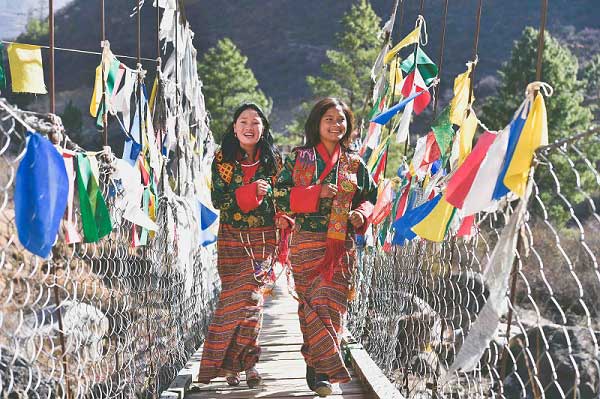Bhutan : 1st Country In The World That Measures “Gross National Happiness” Instead Of “Gross Domestic Product”

New Delhi : Bhutan situated in the lap of nature, is such a country that lays emphasis on prosperity. While the entire world’s emphasis is on GDP “Gross Domestic Product”, Bhutan measures the standard of living of its citizens with GNH “Gross National Happiness”. This is a big difference that separates Bhutan from the whole world.
The amount of oxygen in the winds of Bhutan is so high that you feel fresh all the time, you will not find commercials on the walls and roads here and there is neither a grand shopping mall nor a traffic light in the cities. There are more monks than soldiers in this country. No person appears in a hurry. Unaware of the materialistic world, this country gives more preference to self satisfaction and inner happiness.

The small country, which is surrounded between India and China, has a population of about eighty-five million, where most people are Buddhists, Bhutan has democracy and constitutional monarchy. The monarchy has been here since 1907, but in 2008 the king here proclaimed democracy by going ahead with himself. Perhaps this is the reason why Bhutanese see their king with great respect.

Paro’ and ‘Thimphu’ are the two major cities of Bhutan, with Thimphu being the capital of Bhutan, Paro is like a city of dreams, quiet and stagnant which gives peace. The beauty of the Paro Valley mesmerizes you, it is a city where you can get lost in the splendor of simplicity. Bhutan has the only airport in Paro. As soon as you enter Paro, it feels as if you have gone back somewhere in time, it feels like an ancient city. A river also flows along the entire city, perfectly clean, transparent and calm. The specialty of Paro city is the lush green valleys here. It is a carefree city where there is no multi-storey house and farming is done in the city itself. Paro is also famous for its mysterious Tiger Nest which is built at an altitude of 3120 meters, is one of the most sacred Buddhist monasteries of Bhutan, the place of starting the monastery from Paro city is about 12 kilometers away.

Bhutanese are very sensitive about their culture and environment, it is probably the only ‘Carbon Negative’ country in the world where 70 percent of the land is covered by trees and plants. Environmental protection is emphasized in both their policies and habits. According to the constitution of Bhutan, it is mandatory to preserve 60 percent of the land here for forests and tree plants, here economic benefits are not given importance in lieu of natural beauty and wealth. Since 1999, plastic bags have also been banned here. Bhutan residents are also very conscious about the environment. They are taught to love the environment from childhood.

Bhutan has a very small number of private vehicles, most people use public transport. Even though there is greenery all around in Bhutan, people plant a separate garden in their homes and grow colorful flowers in it. Bhutanese people respect nature a lot. Their love for nature is divine. They are connected to these mountains by heart. Expressing pride in the love and protection of their nature, you’ll find any common Bhutanese telling that ‘Despite having trees and plants in most of the land of their country, they are constantly planting new trees instead of exploiting them and when the child was born in their king’s house, the whole country planted 2 crore trees.’ Bhutanese try to return it many times more than what they take from nature and that is why their country is fully covered by carbon emissions which is an example for other countries of the world.

Despite the scarcity of resources in the country, the government is sensitive to the basic needs of the people and pays special attention to basic facilities like education, health. Here law and order is very good and crime rate and corruption are also very low. Law is also strictly followed.

The people of Bhutan are very sociable and full of affection. They are also helpful. But they get a different kind of affection towards Indians. They do not consider Indians different from themselves. The main reason for this is Bhutan’s old cultural relationship with India. Most of the essential goods in Bhutan also come from India.
In May of this year, I got an opportunity to visit Bhutan. I spoke to many people in Bhutan in relation to the Happiness Index, upon which they said that “The main reason for Bhutan’s people to be happy is that they give more importance to value than material things.” Here we are taught since childhood that instead of being disturbed by what you do not have, seek satisfaction and happiness in what you have.” Here family relations and other social relationships are given more importance. A young girl told that “My childhood dream is to become an airhostess, I was preparing for this for a long time and I have given an interview a few days before for it but there are only 3 posts of airhostess and 500 girls have given this interview, if I am not selected in this, I will feel sad but I believe that nature has thought some role for every person who is born, then I will assume that even better job or future is waiting for me and thinking that, I will move forward in life.”

People of Bhutan accept the idea of Buddha’s Middle Way, that is why they do not want many things and it is not that they do not have anything. This is the balance that Bhutanese have kept. This is also the idea at the core of the Happiness Index which was brought by the Emperor Jigme Singye Wangchuck in 1972. After that Bhutan decided that the scale of prosperity in their country would not be GDP but things that would make citizens happy and harmonize human and nature. This was a great idea, but it was also contrary to the current time in which the whole world considers ruthless exploitation of nature to earn capital. But this development has caused irreparable damage to nature and has also widened the gap of non-equality. There is another limitation of this development model, here the emphasis is only on physical prosperity. But this is not enough, it is not necessary that everything can be bought with money. We can see rich people around us immersed in grief, dissatisfaction, depression and despair and committing suicide.

Bhutan has included social development, cultural conservation, environmental protection and good governance as a measure in its overall national prosperity. The Gross Happiness Index has been implemented in Bhutan since 1972, since then the rate of living there has almost doubled and access to basic facilities like education and health has reached almost the entire population. Bhutan’s plans for the future are commendable, with a target of zero net greenhouse gas by 2030 and generating zero waste. For this, emphasis is being laid on renewable energy such as bio gas, wind, and solar energy and all the vehicles have to be replaced with electric vehicles. There is a program to plant new trees.

But Bhutan’s biggest success is something else. Slowly, the world is changing its outlook on right development and happiness. Now the world is paying attention to Bhutan’s ideas. The scale of progress and the importance of real prosperity are being understood. In 2010, the ‘Well Being and Happiness Index’ was also started in Britain. In 2011, the General Assembly of the United Nations passed the resolution and incorporated the idea of Happiness Index into its agenda and every year, “20 March” has been decided to celebrate Happiness Day all over the world. Similarly, in 2013, the ‘Ministry of Happiness’ was created in Venezuela. The UAE has created a ‘Happiness and tolerance ministry’. Madhya Pradesh has become the first state in the country to create such a department in India, where it has been announced to open a ‘Happiness Department’.
The path the world is following today is the path of destruction. Earth is the only known planet in the entire universe where there is an environment suitable for life. But ‘we’, the most intelligent creature of this blue planet, is spoiling the balance of the earth. Many organisms have become extinct from the earth, if this condition remains, then in the coming years more flora and fauna may be lost from this earth, including humans themselves. Bhutan’s model is the future model of the world. It is not easy to adopt it but there is no other option left. If ever you get a chance to visit Bhutan, do not forget to take a lesson to be happy by harmonizing with nature. ‘BHUTAN IS THE FUTURE.’










